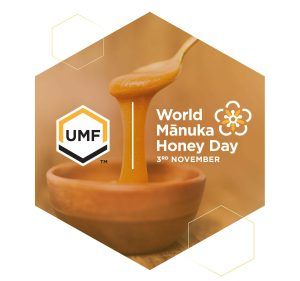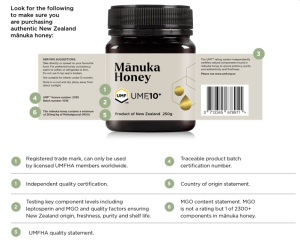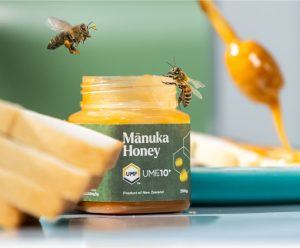On World Mānuka Honey Day, November 3, 2025, the UMF Honey Association is sharing with everyone how to choose authentic New
Zealand Mānuka honey, how to use it responsibly for wellness and how people can find out more about what makes this amazing natural health product sought after in more than sixty countries.
UMF™-certified Mānuka honey from New Zealand supports everyday wellness with naturally occurring antibacterial and antioxidant activity. People commonly use it to support immunity and for soothing sore throats, coughs and colds; to help oral, gut and digestive health; and for skin care. Look for the UMF™ quality mark and grade (e.g., UMF™ 5+ to UMF™ 20+) to ensure authenticity and measure strength.
If you are keen to learn more about Mānuka honey, go to our short online course to become a Mānuka Master.
If you are a health professional, you can earn continuing education credits by doing our advanced course on the Today’s Dietitian website here. 
What Makes Mānuka Honey Different?
-
Uniquely New Zealand: True Mānuka honey is produced only in New Zealand, from the nectar of the native Leptospermum scoparium (Mānuka) tree.
-
UMF™ Certification = Trust: The UMF™ (Unique Mānuka Factor) quality mark is an independent, end-to-end test and verification system. It confirms authenticity, country of origin (New Zealand), and potency of key bioactive markers.
-
What UMF™ means: A UMF™ rating (e.g., UMF™ 10+, UMF™ 15+, UMF™ 20+) reflects the concentration of MGO (methylglyoxal) and companion markers like Leptosperin and DHA. Higher numbers indicate greater measured strength.
- While many natural health products rely on one or two active botanical compounds, UMF™-certified Mānuka honey stands out because it brings a suite of bioactive components that are unmatched by other natural health products for natural health benefits.
Mānuka Honey Benefits & Uses
1. Immunity Support
UMF™-certified Mānuka honey is used to support the body’s natural defenses thanks to its antibacterial activity and polyphenol-driven antioxidant profile. Enjoy a spoonful daily, swirl into warm (not hot) water with lemon, or add to yogurt.
2. Sore Throats, Coughs & Colds
A classic winter remedy: a teaspoon slowly dissolved in the mouth can provide soothing relief for dry, scratchy throats. For comfort when you’re under the weather, try a warm Mānuka honey infusion before bed.
3. Influenza (General Comfort)
Mānuka honey does not cure influenza, but many people use it to soothe throat discomfort and help maintain hydration alongside rest and fluids. Always follow medical advice for flu symptoms.
4. Oral Health
Use Mānuka honey as part of a balanced oral-care routine. Its low moisture and natural activity help make the mouth less hospitable to undesirable bacteria. Swallow rather than hold on teeth, and maintain daily brushing/flossing.
5. Gut & Digestive Health
A small daily serve may support digestive comfort. Many people add Mānuka honey to fiber-rich breakfasts or post-meal herbal teas as a gentle, prebiotic-friendly habit.
6. Support for Microbiome Balance and Natural Healing
Emerging research indicates that UMF™- certified Mānuka honey may help support a healthy microbiome — not only in the gut, but also on the skin and in the mouth. Unlike many antibacterial agents that indiscriminately kill both good and bad bacteria, the natural bioactives in Mānuka honey appear to help rebalance microbial communities while still defending against harmful bacteria.
The is potential for this action to support the body’s own healing processes and promote harmony between immunity, digestion, and skin health — something few other natural health products can offer in one simple, whole-food form.
7. Skin Health
For external use, some people apply Mānuka honey as a short contact mask on clean skin to support the skin barrier and help with occasional dryness. Rinse thoroughly. For wounds or persistent skin concerns, seek clinical-grade products and professional guidance.
8. Metabolic Health
As part of a whole-food diet, Mānuka honey can be a flavorful alternative to refined sweeteners. Mind portion sizes, especially if you manage blood sugar—follow your health professional’s advice.
9. Antioxidant Benefits
Naturally present phenolic compounds contribute to antioxidant activity, which helps neutralize free radicals. Enjoy Mānuka honey with vitamin-rich fruits for a tasty antioxidant pairing.
10. Antibacterial & Anti-inflammatory Properties
UMF™ ratings reflect measured antibacterial potency driven largely by MGO (with supporting markers). Many users also value honey’s soothing qualities in wellness routines.
How to Choose Your Mānuka Honey Strength
-
Everyday wellness & pantry use: UMF™ 5+ to UMF™ 10+
-
Targeted support (seasonal throat/cough comfort, skin care): UMF™ 10+ to UMF™ 15+
-
High potency needs (short-term, specific uses): UMF™ 15+ to UMF™ 2
Tip: Check for the UMF™ quality mark on the label. It’s your shortcut to authenticity and strength.
How to Use Mānuka Honey
-
Daily spoon: 1–2 tsp straight from the jar.
-
Warm drink: Stir into warm water (not boiling) with lemon/ginger.
-
Food pairing: Drizzle over yogurt, oats, berries or toast (avoid heat)
-
Oral comfort: Let a half-teaspoon melt slowly in the mouth.
-
Skin (cosmetic): Short contact mask on clean skin, then rinse.
-
Do not give to children under 12 months. If you have diabetes, allergies, or are pregnant/breastfeeding, consult a health professional.
Authenticity Checklist (Before You Buy)
-
UMF™ quality mark on the front label.
-
UMF™ rating (e.g., UMF™ 10+, 15+, 20+).
-
Packed in New Zealand with batch/trace details.
-
“Product of New Zealand” — real Mānuka honey comes only from New Zealand.

Multiple proof points for manuka honey UMF certification
World Mānuka Honey Day — November 3, 2025
Celebrate the people, places and science behind Mānuka honey—from New Zealand’s native landscapes to the beekeepers and researchers who safeguard quality. Use the day to check your jar’s UMF™ rating, refresh your wellness ritual, and share a Mānuka moment with friends.
Common Questions (FAQ)
What does UMF™ mean?
UMF™ stands for Unique Mānuka Factor. It’s an independent certification that verifies Mānuka honey’s authentic New Zealand origin, purity, quality and strength based on MGO, Leptosperin DHA and HMF.
Which UMF™ number should I choose?
For daily use, start with UMF™ 5+–10+. For targeted, short-term support (e.g., throat comfort or skin), consider UMF™ 10+–15+. For high potency, UMF™ 15+–20+. Always follow label directions.
Is Mānuka honey good for sore throats and coughs?
Many people use it to soothe sore throats and support comfort during seasonal coughs and colds. It’s not a cure; seek medical advice for persistent or severe symptoms.
Can I use Mānuka honey on my skin?
For general cosmetic use, yes—apply a thin layer to clean skin for a short period, then rinse. For wounds or ongoing skin conditions, seek clinical guidance.
Is all Mānuka honey from New Zealand?
Yes. Authentic Mānuka honey comes only from New Zealand’s manuka tree. Look for UMF™ certification to confirm.
What is the Difference Between UMF™ vs MGO?
UMF is an independent, comprehensive, strength rating and quality assurance system that assures the potency and authenticity of multiple bioactive compounds in Mānuka honey and their shelf life and compliance to label information for the lifge of the product. MGO is a measure in mg/kg of a single bioactive that tell you the content at the time of testing but provides no further information.
Because manuka honey has multiple bioactive components that like a probioitic can diminish over time ro when exposed to stress susch as heat it is important to have a quality and rating test appropriate to the complexity of the honey.
Health researchers can find more informatin about manuka honey here.
There is a UMFHA page for health professionals here


